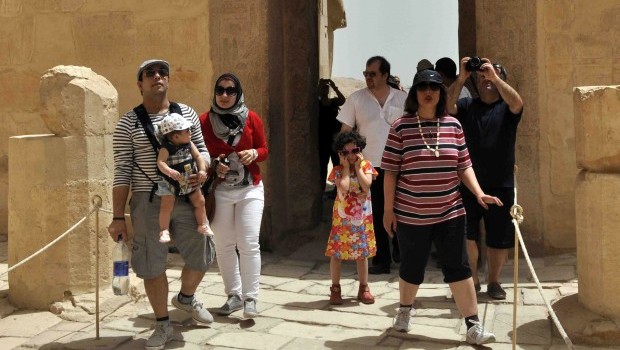
Iranian tourists visit the Hatshepsut Temple, in the ancient southern city of Luxor, Egypt, Tuesday, April 2, 2013. (AP Photo)
Cairo, Asharq Al-Awsat—Informed Egyptian sources have revealed that there is a dispute between Cairo and Tehran over restricting the movements of Iranian tourists in Egypt. The Egyptian side, via the minister of tourism Hisham Zazou, is planning to direct Iranian tourists towards historic monuments and beach resorts, and away from the mosques of the ‘Ahl Al Bait’ (companions and relatives of the prophet). Meanwhile Iran, through its diplomatic representative in Cairo, Mojtaba Amani, wants everywhere in Egypt to be open and unrestricted for tourists coming from Iran, which it is claimed could provide around 2 million visitors a year.
This dispute comes at a time when Iran’s deputy foreign minister for the Middle East and North Africa, Hossein Amir Abdollahian, has affirmed that his country is not looking at any location in Egypt, whether religious or tourist or otherwise, from a sectarian perspective. Meanwhile, the Salafi movement in Egypt is escalating its opposition towards rapprochement with Iran, warning of unrest in Egypt because “Iran is seeking to export the Khomeinist revolution,” according to Bassam Al-Zarqa, former political adviser to President Mohammed Mursi.
Relations between Cairo and Tehran were severed three decades ago due to differences in the two countries’ strategic orientations towards the Middle East, especially with regards to peace with Israel and the security of the Gulf region. The recent visit to Cairo undertaken by Abdollahian reflects the growing pace of Egyptian-Iranian rapprochement, especially after President Mursi traveled to Tehran following his election last year, and his Iranian counterpart Mahmoud Ahmadinejad visited Cairo earlier this year.
Iran, which is suffering from international sanctions and a negative global image due to its nuclear program, has offered to help Egypt economically, raising fears among certain Egyptians that Tehran is seeking to interfere in Egypt’s affairs. There are even reports that Iran is seeking to purchase and run the Ahl Al-Bait mosques in Cairo, providing Egypt with USD 30 billion in aid in return. However, Abdollahian, speaking in a press conference on Monday during his visit to Cairo, said that Iran does not have any intention to run Egyptian mosques. He considered this to be “merely a false accusation”, brushing off the concerns of some Egyptian forces of Shi’a interference in their country. He explained, “We support the Shi’a Hezbollah party in Lebanon, as well as the Sunni Hamas and Islamic Jihad movements in Palestine.”
On Sunday morning, the city of Luxor, southern Egypt, received the first Iranian tour group, consisting of 58 visitors, arriving to explore the monuments there. The visit was accompanied by strict security measures “for fear of an attack or assault by Salafi movements, who reject the normalization of tourism with Iran,” as reported by an Egyptian security official.
Egyptian Tourism minister Zazou ruled out that the Iranian tourist groups that have begun to arrive in his country are aiming to promote Shi’ite religious and cultural tourism in Egypt. In response to a question by Asharq Al-Awsat, Zazou replied that Egypt and Iran have agreed that tourism programs between the two countries will be based on recreational trips only.
Regarding the concerns of Egyptian Salafi groups towards Iranian tourism and the spread of Shi’ism, Zazou stressed that Iranian tourists would be restricted to visiting Egyptian monuments or taking leisure trips to the Mediterranean or the Red Sea. He affirmed that no Iranian tourist itinerary would include a visit to holy sites or the Ahl Al-Bait mosques in Caro. He added that if Iranian tourists stray from the program that has been agreed upon, the tourism door with Iran will once again be closed.
However, Mojtaba Amani, head of the Iranian Interests Office (the acting Iranian embassy) in Egypt, said that it is the right of Iranian tourists to visit any place they want in Egypt, and it is not possible to interfere in the itineraries of Iranian and Egyptian tourism companies. In an interview with MBC Egypt on Sunday, Amani predicted that the number of Iranian tourists in Egypt would soon amount to 2 million annually.
For his part, Bassam Zarqa, speaking to Asharq Al-Awsat about Iranian rapprochement with Egypt, said, “Any country that wants to have a regional or global role must have political relations with everyone, provided that these relations do not cause a threat to the national security of the country.” He added, “Iran has a Persian-Shi’ite project, a combination between Persian ethnicity and sectarian fanaticism, and there is no country where Iran has interfered without causing problems.”
Zarqa added, “Now Hezbollah is taking part in the suppression of the Syrian people, and the Houthis in Yemen are receiving weapons from Iran. They [the Iranians] are also active in Africa in the same way. Ever since the beginning of the Khomeinist revolution they have declared that they want to export their approach. So, we must be cautious when it comes to relations with them, in order to achieve the interests of Egypt without Iranian interference.” He added that “the Salafists’ fears of rapprochement with Iran are justified. As we say in Egypt, ‘ask someone who has been through it; do not ask a doctor’.”
Returning to Abdollahian, the Iranian official indicated that during his visit to Cairo he had held consultations with Egyptian and regional officials including UN-Arab League envoy Lakhdar Brahimi, secretary general of the Arab League Nabil El-Araby, and Egyptian foreign minister Mohamed Kamel Amr. He said that “Iran will continue to support the axis of resistance in the Middle East. Iran strongly supports the Syrian people and Bashar Al-Assad’s reforms, along with the mechanism for a peaceful solution. Iran considers the decisions issued outside of Syria in this regard to be strategic mistakes.”

Trackbacks/Pingbacks